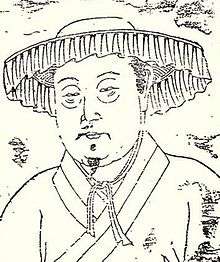Zhang Yanghao
| Zhang Yanghao | |
|---|---|
 | |
| Born |
1270 Licheng District, Jinan |
| Died | 1329 |
| Nationality | Yuan Dynasty |
| Occupation | writer, government official |
| Known for | Sanqu poetry |
Zhang Yanghao (simplified Chinese: 张养浩; traditional Chinese: 張養浩; pinyin: Zhāng Yǎnghào; 1270–1329), courtesy name Ximeng, was a writer from Shandong who lived during the Yuan Dynasty and authored prose, poems, as well as songs.[1] He is particularly well known for his Sanqu poetry.[1] Among his works is one of the most frequently anthologized poems of the "meditation on the past" (Chinese: 怀古; pinyin: huáigǔ) genre, a song poem titled "Meditation on the Past at Tong Pass" (Chinese: 潼关怀古; pinyin: Tóngguān Huáigǔ) and set to the tune of "Sheep on Mountain Slope" (Chinese: 山坡羊; pinyin: Shānpō yáng).[2] Besides his work as a writer, Zhang Yanghao also held high government posts and served at one time as head of the Ministry of Rites.[3] His tomb is in Shandong, to the north of the city center of Jinan.
Meditation on the Past at Tong Pass
The song poem "Meditation on the Past at Tong Pass" is Zhang Yanghao most well-known work. It reads:
| 峰峦如聚, | Fēng luán rú jù, | Peaks and ridges press together, |
| 波涛如怒, | bō tāo rú nù, | waves and torrents rage, |
| 山河表里潼关路。 | shān hé biǎo lǐ Tóng Guān lù. | zigzagging between the mountains and the river runs the road through Tong Pass. |
| 望西都, | Wàng xi dū, | I look to the western capital, |
| 意踌躇。 | yì chóu chú. | my thoughts linger. |
| 伤心秦汉经行处, | Shāng xīn qín hàn jīng xíng chǔ, | It breaks my heart to come to the old place of the Qin and Han, |
| 宫阙万间都做了土。 | gōng jué wàn jiān dōu zuò le tǔ. | now palaces and terraces have all turned to dust. |
| 兴, | Xìng, | [Dynasties] rise, |
| 百姓苦; | bǎi xìng kǔ; | the common folk suffer; |
| 亡, | Wáng, | [Dynasties] fall, |
| 百姓苦。 | bǎi xìng kǔ. | the common folk suffer. |
List of poems
- Untitled (Chinese: 普天樂·楚離; pinyin: Pǔtiān yuè·Chu lí)
- Untitled (simplified Chinese: 庆东原; traditional Chinese: 慶東原; pinyin: Qìng dōng yuán)
- Shan Po Yang: Thinking of the Past at the Tong Pass (Chinese: 山坡羊:潼关怀古; pinyin: Shān pō yáng: Tóng guān huái gǔ)
References
- 1 2 Kwai-cho Ho, A study of Zhang Yanghao (1270-1329) and his Sanqu, PhD thesis, The University of Hong Kong,1994
- ↑ Zong-Qi Cai, How to Read Chinese Poetry: A Guided Anthology, Columbia University Press, 2008
- ↑ Tian Yuan Tan, Songs of Contentment and Transgression: Discharged Officials and Literati Communities in Sixteenth-Century North China, Harvard University Press, 2010. p. 48
| Wikimedia Commons has media related to Zhang Yanghao. |